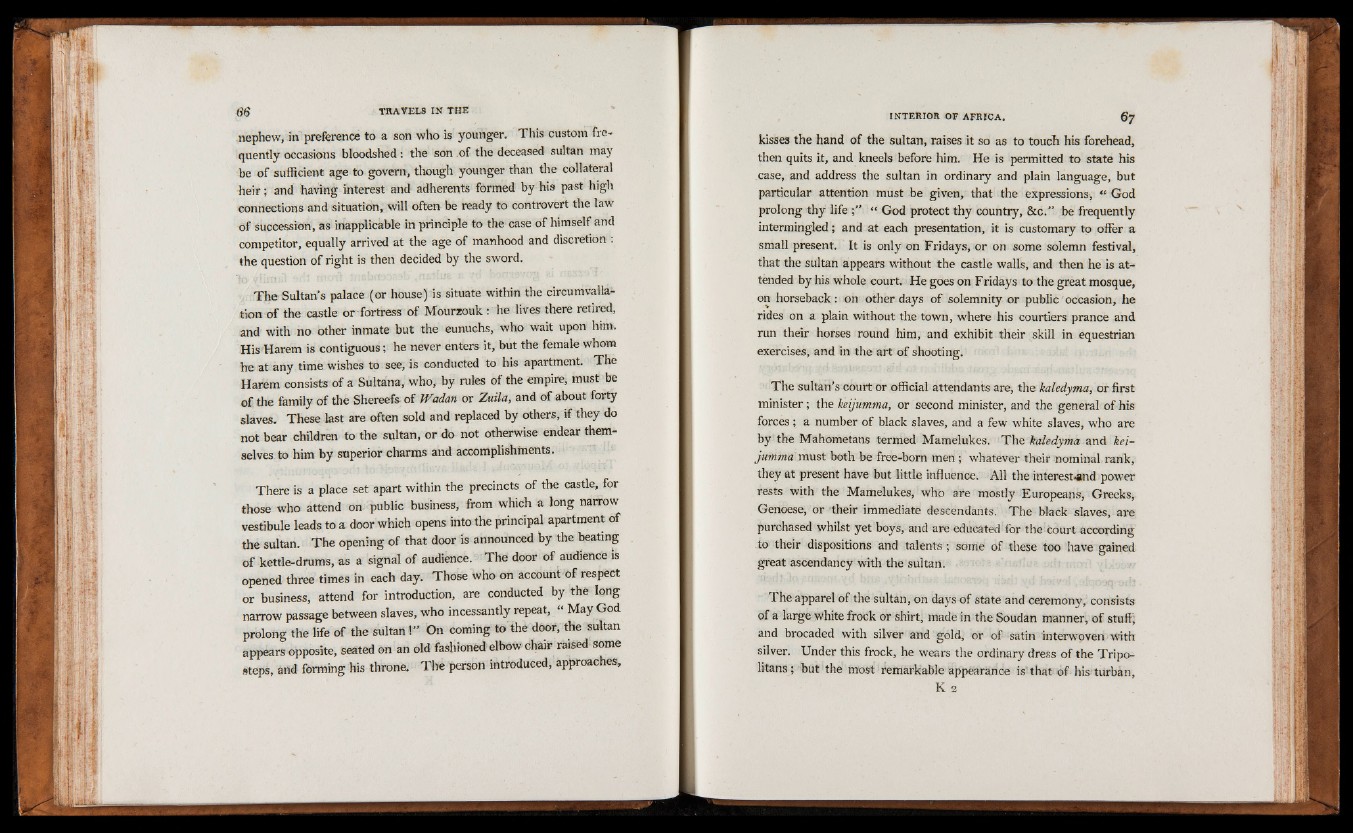
nephew, in preference to a son who is younger. This custoni frequently
occasions bloodshed: the son .of the deceased sultan may
be of sufficient age to govern, though younger than the collateral
heir; and having interest and adherents formed by his past high
connections and situation, will often be ready to controvert the law
of succession, as inapplicable in principle to the case of himself and
competitor, equally arrived at the age of manhood and discretion :
the question of right is then decided by the sword.
The Sultan’s palace (or house) is situate within the circumvalla-
tion of the castle or fortress of Mourzouk : he lives there retired,
and with no other inmate but the eunuchs, who wait upon him.
His Harem is contiguous; he never enters it, but the female whom
he at any time wishes to see, is conducted to his apartment. The
Harem consists of a Sultana, who, by rules of the empire, must be
of the family of the Shereefs of Wadan or Zutla, and of about forty
slaves. These last are often sold and replaced by others, if they do
not bear children to the sultan, or do not otherwise endear themselves
to him by superior charms and accomplishments.
There is a place set apart within the precincts of the castle, for
those who attend on- public business, from which a long narrow
vestibule leads to a door which opens into the principal apartment of
the sultan. The opening of that door is announced by the beating
of kettle-drums, as a signal of audience. The door of audience is
opened three times in each day. Those who on account of respect
or business, attend for introduction, are conducted by the long
narrow passage between slaves, who incessantly repeat, “ May God
prolong the life of the sultan!” On coming to the door, the sultan
appears opposite, seated on an old fashioned elbow chair raised some
steps, and forming his throne. Tire person introduced, approaches,
kisses the hand of the sultan, raises it so as to touch his forehead,
then quits it, and kneels before him. He is permitted to state his
case, and address the sultan in ordinary and plain language, but
particular attention must be given, that the expressions-, “ God
prolong thy life;” :'“ God protect thy country, &c/ ’ be frequently
intermingled; and at each presentation, it is customary to offer a
small present. It is only on Fridays, or on some solemn festival,
that the sultan appears without the castle walls, and then he is attended
by his whole court. He goes on Fridays to the great mosque,
on horseback: on other days of solemnity or public occasion, he
rides on a plain without the town, where his courtiers prance and
run their horses round him, and exhibit their skill in equestrian
exercises, and in the art of shooting.
The sultan’s court or official attendants are, the kaledyma, or first
minister; the keijumma, or second minister, and the general of his
forces ; a number of black slaves, and a few white slaves, who are
by the Mahometans termed Mamelukes. The kaledyma and keijumma
must both be free-born men; whatever their nominal rank,
they at present have but little influence. All the interest-and power
rests with the Mamelukes, who are mostly Europeans, Greeks,
Genoese, or their immediate descendants. The black slaves, are
purchased whilst yet boys, and are educated for the court according
to their dispositions and talents; some of these too have gained
great ascendancy with the sultan.
The apparel of the sultan, on days of state and Ceremony, consists
of a large white frock or shirt, made in the Soudan manner, of stuff;
and brocaded with silver and gold, or of satin interwoven with
silver. Under this frock, he wears the ordinary dress of the Tripolitans;
but the most remarkable appearance is'that of his turban,
K 2